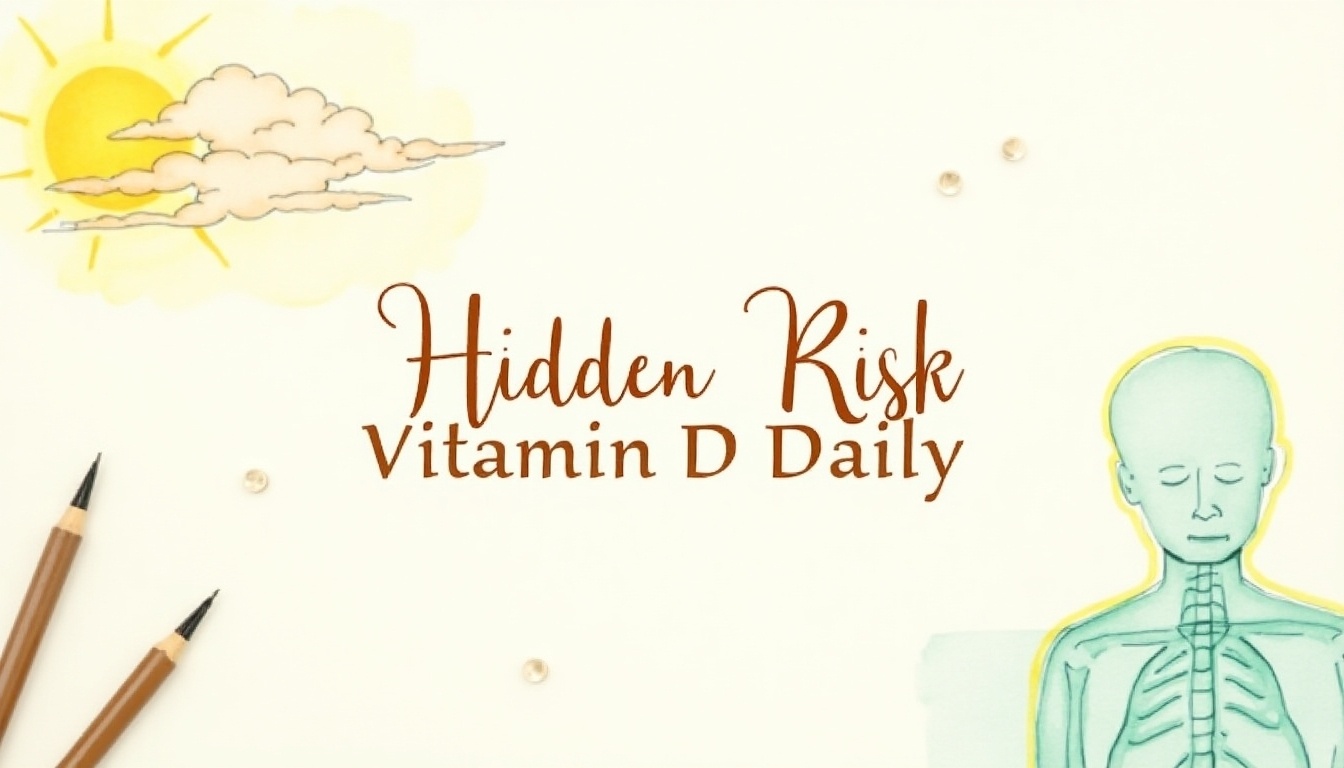Many older adults turn to vitamin supplements like Vitamin D to stay healthy, but it’s important to be careful with daily doses. While Vitamin D supports brain health and bone strength, taking more than 1,000 IU without checking with a doctor can cause problems like high calcium levels in the blood. This risk becomes greater if someone is already on medication or has health issues. Just because vitamins are easy to get doesn’t mean they’re always safe in large amounts. Consulting a healthcare provider first helps avoid complications and ensures supplements won’t interfere with other treatments or worsen existing conditions.
Table of Contents
- The Silent Danger of High-Dose Vitamin D in Seniors
- How Vitamin D Can Harden Arteries and Raise Stroke Risk
- Vitamin E and Blood Thinners: A Risky Combination
- Vitamin A Overdose and Its Neurological Impact
- Niacin and Sudden Blood Pressure Spikes in Older Adults
- Common Factors That Lower Vitamin D Absorption
- Why Timing and Dosage Matter for Vitamin D Supplements
- Hidden Ingredients in Vitamin D Products to Watch For
- Real Food Alternatives to High-Risk Vitamin Supplements
- Steps to Safely Use Vitamins After Age 60
- Frequently Asked Questions
The Silent Danger of High-Dose Vitamin D in Seniors
Vitamin D plays a key role in helping seniors maintain bone health by regulating calcium levels, which is especially important for those at risk of osteoporosis. However, taking high doses of Vitamin D daily, particularly over 1,000 IU without medical supervision, can lead to a dangerous condition called hypercalcemia. This means there is too much calcium in the blood, causing symptoms like nausea, weakness, confusion, irregular heartbeat, and frequent urination. Because Vitamin D is fat-soluble, excess amounts get stored in fat tissue, which can prolong toxicity and make symptoms last longer. Many seniors take supplements to make up for reduced sun exposure but may not realize that overdosing can cause kidney problems and other serious health issues. Vitamin D can also interfere with medications such as steroids and weight-loss drugs, changing how these drugs work. Before increasing Vitamin D intake, it is crucial for seniors to get blood tests that check calcium and Vitamin D levels. Personalized dosing based on these results and overall health status is the safest approach. Consulting a healthcare provider ensures that supplementation supports health without risking complications from too much Vitamin D.
How Vitamin D Can Harden Arteries and Raise Stroke Risk
Taking too much Vitamin D can lead to high calcium levels in the blood, which may cause calcium to build up in the arteries. These calcium deposits make blood vessels stiff and less flexible, pushing blood pressure higher. When arteries lose their elasticity, the heart has to work harder to pump blood, increasing the chances of heart disease and stroke. This risk is especially serious for older adults who already have heart or blood vessel problems. The danger grows when Vitamin D supplements are combined with calcium pills, as this can speed up artery hardening. Research shows that long-term use of high Vitamin D doses is linked with a higher chance of ischemic stroke, a type caused by blocked blood flow to the brain. Symptoms like chest pain, fatigue, and trouble breathing can signal this arterial calcification. To protect seniors, it’s important to carefully manage Vitamin D intake and have regular heart health check-ups. Doctors usually suggest moderate doses of Vitamin D along with healthy lifestyle changes to reduce these risks.
Vitamin E and Blood Thinners: A Risky Combination
Vitamin E is known for its antioxidant benefits and support for heart health, but it also has blood-thinning effects that can be dangerous when combined with blood thinners like warfarin. Seniors taking anticoagulants need to be especially cautious, as high doses of Vitamin E, above 400 IU, can significantly increase the risk of bleeding complications. A notable example is an 81-year-old woman who took 800 IU of Vitamin E and suffered a brain bleed due to the amplified anticoagulant effect. While the recommended daily intake of Vitamin E is only about 22 IU, many supplements contain much more, which can interfere with the body’s blood clotting mechanisms and lead to serious issues like hemorrhagic strokes. It’s vital for patients to tell their healthcare providers about any supplements they use and to have their blood clotting times (INR) carefully monitored if Vitamin E and blood thinners are both being taken. Safer alternatives to high-dose Vitamin E should be explored, and any supplementation must be done under medical supervision to avoid dangerous side effects.
| Vitamin | Recommended Daily Intake (IU) | Risk at High Doses | Notable Case | Key Advice |
|---|---|---|---|---|
| Vitamin E | 22 | Increases risk of bleeding, especially with blood thinners | 81-year-old woman on 800 IU suffered brain bleed | Disclose all supplements to healthcare providers; monitor blood clotting |
| Blood Thinners (e.g., Warfarin) | N/A | Effect amplified by high Vitamin E intake, causing dangerous bleeding | Same case involving Vitamin E overdose | Regular blood tests (INR) essential; avoid high Vitamin E without doctor supervision |
| Vitamin E Supplement Limits | Below 400 IU generally safer | High doses amplify anticoagulant effects | Case study highlights risk at 800 IU | Use only recommended doses unless advised by a healthcare professional |
Vitamin A Overdose and Its Neurological Impact
Vitamin A is essential for good vision and a strong immune system, but taking too much can be harmful, especially for older adults. High doses of Vitamin A can lead to a condition called pseudotumor cerebri, which means increased pressure inside the skull. This can cause serious symptoms like severe headaches, blurred vision, dizziness, and nausea. For example, a 79-year-old woman developed these symptoms after taking 10,000 IU of Vitamin A daily, far above the safe limit of about 3,000 IU. Because Vitamin A is fat-soluble, it builds up in the body over time, increasing the risk of toxicity. Over-the-counter supplements and some skin or eye products may contain unsafe levels of Vitamin A, so it’s important to check labels carefully. The neurological symptoms caused by overdose can look like brain tumors, making proper medical diagnosis essential. Usually, symptoms improve once Vitamin A intake is reduced or stopped, but this should only be done under a healthcare provider’s guidance. Consulting with a doctor helps balance the benefits of Vitamin A while avoiding its hidden risks.
Niacin and Sudden Blood Pressure Spikes in Older Adults
Niacin, or Vitamin B3, is often taken to help raise good cholesterol levels, but it carries risks that older adults need to be aware of. High doses of niacin cause blood vessels to dilate, leading to flushing and sometimes sudden spikes in blood pressure. This effect is especially concerning for seniors, as these sudden increases can trigger mini-strokes or transient ischemic attacks (TIAs). The impact of niacin on blood pressure depends on both the dose and an individual’s health status, making it unpredictable for many older adults. Those with pre-existing hypertension or cardiovascular disease are particularly vulnerable to these adverse reactions. Over-the-counter niacin supplements can vary widely in strength and quality, which adds another layer of risk for self-medicating seniors. Some forms of niacin, like nicotinic acid, are more likely to cause side effects compared to others, such as nicotinamide. For these reasons, regular blood pressure monitoring is essential when taking niacin supplements. Doctors usually prescribe niacin cautiously, keeping a close eye on both cholesterol and blood pressure levels to avoid complications. Taking high doses of niacin without medical guidance can be dangerous, so older adults should always consult their healthcare provider before starting any niacin regimen.
Common Factors That Lower Vitamin D Absorption
As we age, our skin becomes less efficient at producing Vitamin D from sunlight, which naturally lowers levels in many seniors. This issue is often made worse by the use of sunscreen or wearing clothing that blocks UVB rays, further reducing the body’s ability to make Vitamin D. Certain medications, such as steroids and some weight-loss drugs, can interfere with how Vitamin D is absorbed or processed. Additionally, gastrointestinal conditions like celiac disease or Crohn’s disease impair the gut’s ability to take in nutrients, including Vitamin D. Obesity is another factor that complicates Vitamin D availability because the vitamin gets trapped in fat tissue, making it less accessible to the body. Problems with the liver or kidneys can also reduce the conversion of Vitamin D into its active form, which is necessary for its benefits to take effect. On top of this, many seniors have a low dietary intake of Vitamin D and may spend limited time outdoors, which only adds to the risk of deficiency. Genetic differences also play a role in how efficiently Vitamin D is metabolized and absorbed, meaning not everyone responds the same way to supplementation. For those with malabsorption syndromes, medical treatment is often needed to ensure adequate Vitamin D levels. Understanding these factors is crucial to tailor Vitamin D supplementation safely and effectively for each individual, rather than assuming a one-size-fits-all approach.
Why Timing and Dosage Matter for Vitamin D Supplements
Vitamin D is fat-soluble, so taking it with meals that contain some fat helps your body absorb it better. Instead of swallowing one large dose, splitting it into smaller amounts throughout the day can prevent sudden spikes in blood calcium levels, which reduces the risk of side effects. Taking a big dose all at once might seem convenient, but it can increase the chance of vitamin D toxicity, especially for seniors. Morning intake tends to work better with the body’s natural hormone rhythms and may boost how well vitamin D works. Keeping a steady daily dose helps maintain stable vitamin D levels in the blood, which is important for overall health. Since sun exposure varies through the year, adjusting your vitamin D dose seasonally makes sense to avoid deficiency or excess. It’s also important to monitor blood levels regularly, so your doctor can recommend the right dose for you. Older adults should be especially careful and follow personalized schedules, as other factors like medications and calcium intake can affect risks like hypercalcemia. Ignoring these details about when and how much vitamin D to take can lead to problems, even if you’re trying to stay healthy with supplements.
Hidden Ingredients in Vitamin D Products to Watch For
Many Vitamin D supplements contain more than just the vitamin itself, and these hidden ingredients can pose risks, especially for seniors. Some products add calcium, which might sound helpful but can increase the risk of calcium buildup in the blood if combined with other calcium sources, leading to toxicity. Additionally, fillers and binders used to hold capsules together can trigger allergic reactions or digestive problems in sensitive individuals. It’s also common for manufacturers to include other vitamins like A or K alongside Vitamin D. While these can be beneficial in small amounts, they may interact dangerously or build up in the body if taken without guidance. The quality of Vitamin D supplements varies widely; some brands may not meet purity standards, resulting in inaccurate dosages or contamination with heavy metals. Even products labeled as “natural” can contain synthetic additives or preservatives that aren’t obvious from the packaging. Synthetic forms of Vitamin D may work differently in the body compared to natural versions, affecting how the vitamin is processed and used. To reduce these risks, it’s important to read labels carefully to spot potential allergens or harmful additives. Choosing supplements with third-party testing seals provides extra assurance of safety and quality. Above all, consulting a healthcare provider before starting any Vitamin D supplement helps ensure you pick a trusted brand and avoid unexpected problems from hidden ingredients.
Real Food Alternatives to High-Risk Vitamin Supplements
Choosing real foods over high-dose vitamin supplements can reduce health risks, especially for seniors. Fatty fish like salmon and mackerel offer natural vitamin D in safe amounts, avoiding the dangers of overdose. Egg yolks and fortified dairy products provide moderate vitamin D levels that support bone health without excess. Leafy greens and nuts are great sources of vitamin E, along with other nutrients that benefit the heart and brain, delivered in balanced doses that rarely cause harm. For vitamin A, foods such as carrots, sweet potatoes, and spinach supply it in forms the body can regulate more easily, lowering the risk of toxicity seen with high-dose supplements. Whole grains and legumes add B vitamins, including niacin, which supports heart health without the sudden blood pressure spikes linked to supplement misuse. Eating a varied diet naturally reduces the need for high-dose pills, as foods provide nutrients in combinations that promote better absorption and fewer side effects. Combining this dietary approach with moderate supplement use, when advised by a healthcare provider, helps older adults meet their vitamin needs more safely and sustainably.
Steps to Safely Use Vitamins After Age 60
Before starting or changing any vitamin or supplement routine, it’s important to talk with a healthcare professional. They can recommend blood tests to check your current vitamin levels and spot any deficiencies or excesses. Older adults should stick to the recommended daily allowances because taking too much can cause serious health problems, such as vitamin D toxicity or increased bleeding risk from vitamin E. Always inform your doctor about all medications and supplements you use so they can watch for harmful interactions. Choose supplements that have been verified by third-party testing to ensure quality and safety. It’s best to begin with low doses and only increase them under medical supervision based on your test results. Pay attention to side effects like headaches, dizziness, or unusual bleeding, which could signal a problem. Avoid self-medicating with high-dose vitamins bought online or without a prescription, as these can be dangerous. Complement supplements with a balanced diet rich in nutrients to reduce the chance of overdosing. Lastly, regularly review your supplement needs because your health status can change over time, and what was safe before might need adjustment now.
- Consult a healthcare professional before starting or changing any supplement regimen.
- Get blood tests to assess current vitamin levels and identify deficiencies or excesses.
- Follow recommended daily allowances specific to older adults to avoid toxicity.
- Disclose all medications and supplements to healthcare providers to check for interactions.
- Choose high-quality supplements verified by third-party testing.
- Start with low doses and adjust only under medical supervision based on test results.
- Monitor for side effects such as headaches, dizziness, or unusual bleeding.
- Avoid self-medicating with high-dose vitamins sold online or without prescription.
- Incorporate nutrient-rich foods to complement supplements and reduce overdose risk.
- Regularly review supplement needs as health status changes with age.
Frequently Asked Questions
1. Can taking vitamin D every day cause health problems for seniors?
Yes, taking too much vitamin D daily can lead to health issues like calcium buildup, which may cause kidney damage or heart problems, especially in older adults.
2. How much vitamin D is safe to take daily if I am a senior?
For most seniors, the recommended daily amount is around 800 to 1,000 IU, but it’s important to talk to a doctor before starting supplements to avoid taking too much.
3. What are the signs that I might be getting too much vitamin D?
Common signs include nausea, weakness, frequent urination, and muscle pain. If you experience these, it’s best to check with your healthcare provider.
4. Is it necessary for seniors to take vitamin D every day, or can it be taken less often?
Vitamin D doesn’t always need to be taken daily. Some seniors might take higher doses weekly or monthly under medical supervision, depending on their levels and health.
5. Can taking vitamin D daily interfere with other medications for seniors?
Yes, vitamin D supplements can interact with certain medications like steroids or weight-loss drugs, so seniors should inform their doctors about all supplements and medications they use.
TL;DR Taking daily vitamin supplements may seem beneficial for seniors, but high doses of vitamins D, E, A, and Niacin carry hidden health risks, especially when combined with medications. Excess vitamin D can cause artery hardening and stroke risk, vitamin E may increase bleeding for those on blood thinners, too much vitamin A can affect the brain, and niacin might lead to sudden blood pressure spikes. Absorption and supplement timing also affect safety. It’s important for older adults to consult healthcare providers before starting or changing vitamin routines to avoid harmful side effects and find safer alternatives.



